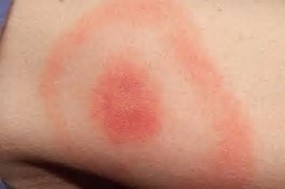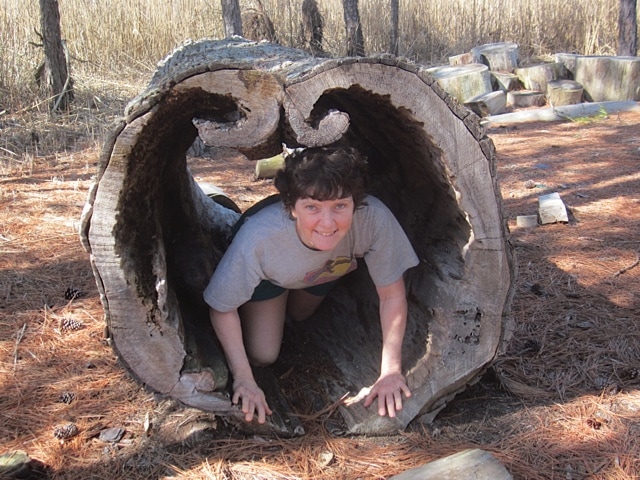|
Dr. Diane King volunteers for the Fauquier Free Clinic and has talked with countless patients about ticks and tick bites. Among other things, ticks can carry the bacteria that causes Lyme disease. Dr. King says to remember that Lyme disease is the sixth most commonly reported disease to the CDC. 95% of Lyme cases are located in 14 states, one of which is Virginia. Our state had 1,102 confirmed cases in 2015. The most common patient is a male between 5 and 10 years of age, the least common is a female from 20-25 years of age and those over 70.
|
The most common months to diagnose Lyme disease are from May through August, peaking in June and July. About 3/4 of cases have the characteristic bulls eye rash, and 1/3 have arthritis. Use DEET on your skin (avoiding the eyes), permethrin on clothing, and do a full body check for ticks every night before bedtime. See your doctor for any suspicious symptoms.
The infection can, but not always, cause a bull’s eye rash, fever, flu like symptoms and joint pain.
The infection can, but not always, cause a bull’s eye rash, fever, flu like symptoms and joint pain.

The infection can cause:
Bulls Eye Rash
Fever
Flu-like symptoms
Joint pain
Bulls Eye Rash
Fever
Flu-like symptoms
Joint pain
Several kinds of ticks carry the bacteria. Woodlands and tall grass are their habitat.They bite mice or deer that are infected with the bacteria and then they infect humans with their bites. Infected ticks are found in Northern Virginia along with the rest of the mid-Atlantic and north-central US. Most people are infected by small immature ticks that feed during the spring and summer months. Campers, hikers, hunters and gardeners are at greatest risk for tick bites.
Tick bites are usually found on the body in hard to see places like the scalp, the groin, armpits and behind the knees. The tick jumps from the grass and weeds on the body and bites a person but because they have a numbing agent in their saliva you don’t feel it. Then with their mouth parts they suck blood over several days and can transfer the bacteria to you.
Even though generally the tick must be attached for 36 to 48 before it infects you, remove the tick as soon as possible. Check yourself with a hand held or full length mirror or have someone check you and any children for ticks every evening.
If you find a tick remove it with a clean tweezers. Grasp the tick by the head and pull straight up with steady pressure. Clean the site with rubbing alcohol, an iodine scrub, or soap and water. Wash your hands also with soap and water. Dispose of the tick by submersing it in alcohol, putting it in a sealed bag, wrapping it in tape, or flushing it down the toilet.
Monitor the person after a tick bite for several weeks and up to 30 days. If a rash or fever develops following the removal of a tick consult a doctor. It is important to let the doctor know when the tick bite happened and the location.
The best way to prevent Lyme disease is to avoid contact with ticks from April to September. Use insect repellents that contain 20%-30% DEET on skin and 0.5% permethrin on clothing and gear. You should also wear light-colored clothing with long sleeves and along pants and tall socks when in the woods or grasslands. If you are in a wooded area or near shady grasslands walk in the center of the trails. Always inspect your entire body, any children and your pets to detect and remove ticks.
Tick bites are usually found on the body in hard to see places like the scalp, the groin, armpits and behind the knees. The tick jumps from the grass and weeds on the body and bites a person but because they have a numbing agent in their saliva you don’t feel it. Then with their mouth parts they suck blood over several days and can transfer the bacteria to you.
Even though generally the tick must be attached for 36 to 48 before it infects you, remove the tick as soon as possible. Check yourself with a hand held or full length mirror or have someone check you and any children for ticks every evening.
If you find a tick remove it with a clean tweezers. Grasp the tick by the head and pull straight up with steady pressure. Clean the site with rubbing alcohol, an iodine scrub, or soap and water. Wash your hands also with soap and water. Dispose of the tick by submersing it in alcohol, putting it in a sealed bag, wrapping it in tape, or flushing it down the toilet.
Monitor the person after a tick bite for several weeks and up to 30 days. If a rash or fever develops following the removal of a tick consult a doctor. It is important to let the doctor know when the tick bite happened and the location.
The best way to prevent Lyme disease is to avoid contact with ticks from April to September. Use insect repellents that contain 20%-30% DEET on skin and 0.5% permethrin on clothing and gear. You should also wear light-colored clothing with long sleeves and along pants and tall socks when in the woods or grasslands. If you are in a wooded area or near shady grasslands walk in the center of the trails. Always inspect your entire body, any children and your pets to detect and remove ticks.
Thank you to Medscape References for information about Lyme Disease.
By Linda Bueno, South Wales Resident, Retired RN, MEd and Volunteer at the Fauquier Free Clinic.
35 Rock Pointe Lane, Warrenton VA 20186 I 540-347-0394 FAX 540-349-3262
The Fauquier Free Clinic is a registered 501(c)(3) Nonprofit organization I EIN # 54-1669652
The Fauquier Free Clinic is a registered 501(c)(3) Nonprofit organization I EIN # 54-1669652




